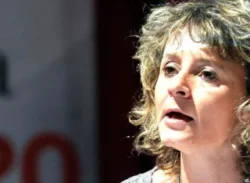 Abraham Lincoln
If given the truth, the people can be depended upon to meet any national crisis...
Abraham Lincoln
If given the truth, the people can be depended upon to meet any national crisis...
 Guildford news...
for Guildford people, brought to you by Guildford reporters - Guildford's own news service
Guildford news...
for Guildford people, brought to you by Guildford reporters - Guildford's own news service
Opinion: Food Shortages – Government Needs to Think Healthy and Think Local
Published on: 7 Mar, 2023
Updated on: 8 Mar, 2023
By Roberta Sonnino
Professor of sustainable food systems at the University of Surrey
When Covid first hit, we were forced to quickly grow accustomed to empty shelves in our once well-stocked supermarkets. It’s been an on-off issue ever since, with different reasons cited: a shortage of lorry drivers, bird flu, and more.

The latest is, of course, salad veg owing to problems in Spain, where most of our winter supplies are grown.
Many (including certain turnip-eating politicians) would argue that it’s no bad thing for the British public to eat more seasonally, and there is value in that argument.
 However, with high fuel prices and established ways of eating, salad shortages are hammering the diets of people in the UK. When crisis hits, it’s the vegetables, the backbone of a healthy and sustainable diet, which are quick to disappear.
However, with high fuel prices and established ways of eating, salad shortages are hammering the diets of people in the UK. When crisis hits, it’s the vegetables, the backbone of a healthy and sustainable diet, which are quick to disappear.
The disruption in the supply of tomatoes, cucumber and peppers is a problem, but couple it with food price rises and it hits harder.
But where are the subsidies to tackle the impact on our consumption of healthy foods?
There’s a paradox across the whole globe: we’ve spent decades giving money to farmers, but the commoditisation of food means we provide too much of the wrong types of food. There are little or no subsidies for fruit and veg producers.
Two things suffer as a result: people’s health, especially those with lower incomes; and the environment.
When considering the multitude of problems, fingers also point at Brexit. The fact that European countries aren’t missing salad vegetables to the same extent as we have in the UK makes it hard to argue against the impact of leaving the EU.
Amongst other things, labour shortages caused by Brexit have left healthy products unpicked in fields.
But on the plus side, leaving the Common Agricultural Policy does offer an opportunity for UK farmers to be incentivised differently, at least.
In January, the government published its plans to offer farmers funding in return for up to 280 different actions that protect the environment, from conserving hedgerows or maintaining peatlands to growing organic fruit or establishing habitat for skylarks.
I can’t see that it will solve our system food supply issues, but it is a small step in the right direction.
What we need is more substantial, systemic change to make it financially rewarding for farmers to grow healthy foods. This is a priority globally, but it needs to start here in the UK.

Professor Roberta Sonnino, a global expert on sustainable food systems, said: “Listen to people tackling the problem at local levels”.
Food is a connector that impacts everyone and everything: the economy, health, agriculture, environment, business, transport and more.
It’s an obvious priority but government responses are piecemeal and inadequate. We need collaboration and for governments to listen to the voices of people tackling the problem at local levels.
In our area, the Surrey Food Partnership brings together partners from across Surrey to take ownership and develop a food strategy and action plan that aim to combat food insecurity and malnutrition and tackle environmental issues within the food system, food waste and siloed thinking in policy making.
The local community in Guildford is also taking action into their hands to combat some of the current issues of the food system. Zero Carbon Guildford, for instance, has a community fridge to fight food waste, a zero-waste shop to reduce food packaging and a vertical farm to show the local community how to grow food indoors. No wonder it recently won the Climate Coalition’s Innovative UK Community Project award.
Community gardens like the Rosamund Community Garden also provide a space for learning more about food growing and building a community about food.
It’s these local groups which need voices for government to listen to.
Responses to Opinion: Food Shortages – Government Needs to Think Healthy and Think Local
Leave a Comment Cancel reply
Please see our comments policy. All comments are moderated and may take time to appear. Full names, or at least initial and surname, must be given.
Click on cartoon for Dragon story: Public Asked for Views on SCC’s Proposal for Reduced Speed Limits



Recent Articles
- Notice: GTA German Filmfest – July 2
- Letter: We Need More Yellow Boxes and Enforcement
- Notice: What’s On in July at Guildford Cathedral
- Greenfield, Greenbelt Site Deemed ‘Greybelt’ by Planning Inspector
- Letter: WBC’s CIL Recommendations Are Too Little, Too Late
- Letter: Yellow Box Fines Are Just a Money-raising Opportunity for SCC
- Drivers Caught in Yellow Box Junctions at the Dennis Roundabout Paid £81k to SCC
- Residents Hit By CIL Fees Should Be Offered Full Review, Says Overview Committee
- Plans For New Guildford Preschool Rejected On Road Safety Grounds
- Expert in AI Is New Head of the University of Surrey


Recent Comments
- David Roberts on New Electric Trains Now Arriving at Guildford – 100 Years After the First One Did
- Mark Stamp on Greenfield, Greenbelt Site Deemed ‘Greybelt’ by Planning Inspector
- Simon Dickinson on Drivers Caught in Yellow Box Junctions at the Dennis Roundabout Paid £81k to SCC
- Paula Smith on Comment: What Are We To Make of the GBC Executive ‘Reshuffle’?
- Jim Allen on Drivers Caught in Yellow Box Junctions at the Dennis Roundabout Paid £81k to SCC
- Wayne Smith on Plans For New Guildford Preschool Rejected On Road Safety Grounds
Search in Site
Media Gallery
Dragon Interview: Local Artist Leaves Her Mark At One of England’s Most Historic Buildings
January 21, 2023 / No Comment / Read MoreDragon Interview: Lib Dem Planning Chair: ‘Current Policy Doesn’t Work for Local People’
January 19, 2023 / No Comment / Read MoreA3 Tunnel in Guildford ‘Necessary’ for New Homes, Says Guildford’s MP
January 10, 2023 / No Comment / Read More‘Madness’ for London Road Scheme to Go Ahead Against ‘Huge Opposition’, Says SCC Leader
January 6, 2023 / No Comment / Read MoreCouncillor’s Son Starts Campaign for More Consultation on North Street Plan
December 30, 2022 / No Comment / Read MoreCounty Council Climbs Down Over London Road Works – Further ‘Engagement’ Period Announced
December 14, 2022 / No Comment / Read MoreDragon Interview: GBC Reaction to the Government’s Expected Decision to Relax Housing Targets
December 7, 2022 / No Comment / Read MoreHow Can Our Town Centre Businesses Recover? Watch the Shop Front Debate
May 18, 2020 / No Comment / Read More






Ben Paton
March 8, 2023 at 7:00 am
You cant grow food without land. Not all land is any good for growing food.
So it makes no sense to concrete over Grade 2 and 3 prime agricultural Land.
That’s what Guildford’s disastrous Local Plan proposes at Three Farms Meadow in Ockham.
Government intervention to protect this prime agricultural land is long overdue.
Jules Cranwell
March 8, 2023 at 4:54 pm
It is self-evident that the GBC local plan is direly positioned to support local food production, as it proposes to destroy much-needed prime agricultural land for development on the ‘strategic sites’ of Gosden Hill, Blackwell Farm, and Three Farms Meadows in Ockham. Yet GBC continues to do nothing to revise this discredited plan.
The UK can no longer afford to import 60 per cent of its food from overseas, and must drive to become self-sufficient.
Mike Smith
March 12, 2023 at 11:06 am
There’s something wrong with a country which has both labour shortages on farms and over a million people claiming unemployment benefits.